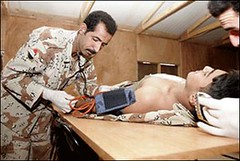By Cpl. Antonio Rosas 1st Marine Division
CAMP AL QA’IM, Iraq — When Iraqi Soldiers and Policemen here are wounded in combat, they used to rely on U.S. service members to patch up their wounds. Not any longer.
Twenty Iraqi Soldiers and Police officers serving near the Iraqi-Syrian border graduated from a combat medical course earlier this month, enabling them to now provide their own emergency care.
The five-week course taught by Coalition forces at the Iraqi camp here will allow wounded Iraqi Soldiers and Policemen to receive medical care from their own staff, lessening their dependency on U.S. medical personnel. The graduation marks another step for the Iraqi military to become a self-sustaining force.
The five-week course taught by Coalition forces at the Iraqi camp here will allow wounded Iraqi Soldiers and Policemen to receive medical care from their own staff, lessening their dependency on U.S. medical personnel. The graduation marks another step for the Iraqi military to become a self-sustaining force.

“The Iraqis will continue to provide security in the region as they’ve been doing only now when they’re wounded, they will be taken care of by their own medics,” said Lt. Col. Paul K. Lebidine, Military Transition Team chief for the 3rd Brigade, 7th Iraqi Army Division.
ReplyDeleteTransition teams are composed of U.S. service members responsible for mentoring and advising the Iraqi Army.
The course is the first of its kind for Iraqi security forces serving in western Al Anbar province. It is designed to teach the Iraqis what U.S. medical personnel deem the most crucial life-saving skills in order to treat casualties in combat.
From learning procedures to stop life-threatening bleeding, treating patients for shock and applying bandages, the Iraqis learn everything U.S. medical personnel use to treat soldiers in combat.
The Iraqis were tested on their knowledge of the medical procedures with written exams and numerous hours of practical application.
“I am very pleased with what I’ve seen from the Iraqi students as they’ve been studying hard, attending classes every day and showing their instructors what they’ve learned,” said Lebidine. “Now they get to show their Soldiers and Policemen what they’ve learned.”
In the past, Iraqi Soldiers here relied entirely on U.S. medical personnel for all their medical needs. Some months, upwards of 30 Iraqi soldiers are treated at the Marines’ medical facility here, according to Navy doctors.
The 20 new graduates will embed with Iraqi military units throughout their various outposts. The plan is to outfit Iraqi Army posts with at least one Iraqi medic, according to Marine officials with the military transition team.
Iraqi Police officers in the region also aim to benefit from the placement of medics, as they have been the target of terrorist attacks in the past.
Just two months ago, two separate insurgent attacks on the police station in Husaybah left five police officers dead. There was no medic on-site. In the city of Ubaydi, a suicide bomber wearing a vest targeted Iraqi Soldiers manning a security post at the city’s hospital. Fortunately, a Navy corpsman was nearby.
With the newly-trained Police medics, rather than relying on U.S. servicemen to respond to incidents, the police department in Husaybah will have an on-site emergency medical provider, said Navy Petty Officer 3rd Class Ricardo Villanueva, assistant instructor for the transition team and a U.S. Navy corpsman.
Once the Iraqi medics are assigned a duty station they will continue to be mentored by Navy corpsmen who serve alongside Marines at the outposts.
“The Iraqis won’t be out there on their own,” said Navy Petty Officer 2nd Class Alfredo N. Alonso, a medical chief with the police transition team.
“The Iraqis will continue to work one-on-one with their American medic counterparts and eventually they will teach combat lifesaving skills to the rest of the officers in their departments,” said Alonso.
Some of the Iraqi Soldiers had prior medical experience, including one student who had studied medicine for two years at university in Baghdad. Others had no medical experience, although Villanueva said most of the students were somewhat educated and had no problems picking up the material.
Although just 20 Iraqis graduated the course, the Americans deem it an important stepping stone for the Iraqis’ progress towards operating independently - and allowing U.S. forces to leave.
“I am glad that the training is finally over and I can start to show what I’ve learned,” said a new graduate. “It has been long hours in the classroom but I know what I’ve learned is important to save lives.”